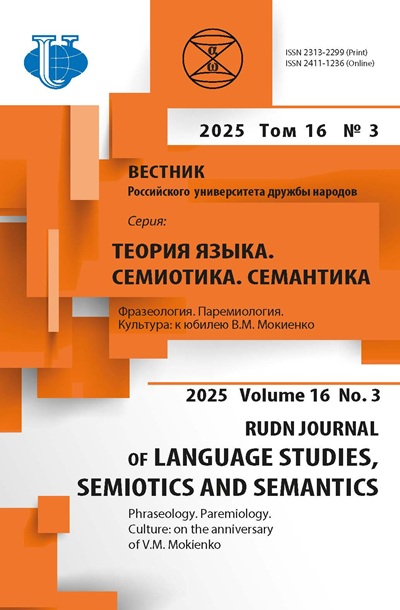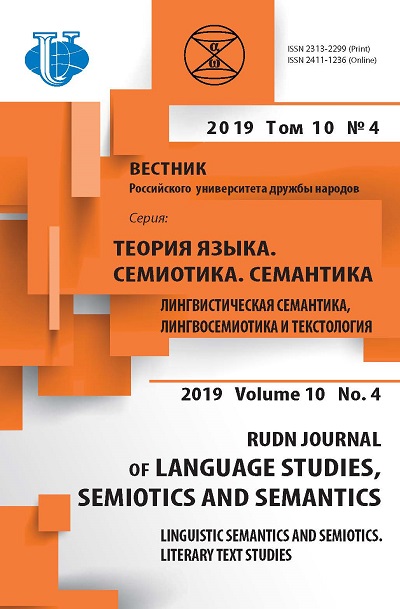Тематическое многообразие бельгийских паремий (на лексикографическом материале)
- Авторы: Сёмина П.С.1
-
Учреждения:
- Российский университет дружбы народов
- Выпуск: Том 10, № 4 (2019): Лингвистическая семантика, лингвосемиотика и текстология
- Страницы: 893-905
- Раздел: ФУНКЦИОНАЛЬНАЯ СЕМАНТИКА
- URL: https://journals.rudn.ru/semiotics-semantics/article/view/22775
- DOI: https://doi.org/10.22363/2313-2299-2019-10-4-893-905
- ID: 22775
Цитировать
Полный текст
Аннотация
Данная статья посвящена рассмотрению основных тем, представленных в бельгийских паремиях. В статье паремия понимается как родовое понятие по отношению к пословицам, поговоркам и приметам. Материалом для исследования послужила авторская картотека паремий французского языка Бельгии, извлеченная приемом сплошной выборки из словаря пословиц и поговорок бельгийской франкофонии. Показано, как паремии отражают национальный характер и особенности мировидения определенного народа. Актуальность проведенного исследования обусловлена необходимостью описания паремиологической картины мира бельгийцев, поскольку до настоящего времени тематическая палитра и описание бельгийского национального характера не являлись предметом детального изучения ни в российской, ни в бельгийской лингвистике.
Ключевые слова
Об авторах
Полина Сергеевна Сёмина
Российский университет дружбы народов
Автор, ответственный за переписку.
Email: karpovapauline@gmail.ru
аспирант направления «Романские языки»
ул. Миклухо-Маклая, 6, Москва, Российская Федерация, 117198Список литературы
- Ломакина О.В., Мокиенко В.М. Познавательный потенциал русинских паремий на фоне русского и украинского языков // Русин. 2016. no 3(45). С. 119-128. DOI: 10.17223/ 18572685/45/9.
- Байрамова Л.К., Иванова М.В. Русская культура в «Аксиологическом фразеологическом словаре русского языка» // Проблемы истории, филологии, культуры. Магнитогорский государственный технический университет им. Г.И. Носова. 2014. no 3 (45). С. 10-12.
- Фирсова Н.М. О национальных характерах испаноязычных и англоязычных народов в сопоставительном плане // Филологические науки. 2004. no 2. С. 51-58.
- Кургузенкова Ж.В., Нелюбова Н.Ю. Фразеологические единицы с компонентами-соматизмами в объективации процесса приема пищи во французской культуре. Вестник РУДН. Серия: Лингвистика. 2012. no 1. С. 66-69.
- Солдаткина Т.А. Базовые концепты английского и французского паремиологического фонда // Современные проблемы науки и образования. Издательский дом «Академия Естествознания». 2013. no 6. Режим доступа: https://www.science-education.ru/ru/article/ view?id=10970 (дата обращения: 1.05.2019).
- Сперанская А.Н. Эффективное речевое общение. Словарь-справочник. Электронное издание. Сибирский федеральный университет. Красноярск, 2014.
- Алефиренко Н.Ф., Семененко Н.Н. Фразеология и паремиология: Учебное пособие для бакалаврского уровня филологического образования. М.: Флинта: Наука, 2009.
- Мокиенко В.М., Никитина Т.Г., Николаева В.К. Большой словарь русских поговорок. М.: ЗАО «ОЛМА Медиа Групп», 2010.
- Семененко Н.Н. Прецедентный потенциал паремий как проблема семантического исследования // Вестник ВолГУ. Серия 2: Языкознание. Волгоград. 2009. no 2 (10). C. 17-23.
- Lamiroy Béatrice. Le français de Belgique et les locutions verbales figées. In: Revue belge de philologie et d'histoire, tome 84, fasc. 3, 2006. Langues et littératures modernes - Moderne taal en litterkunde. pp. 829-844. Электронный ресурс. Режим доступа: https://www.persee.fr/ doc/rbph_0035-0818_2006_num_84_3_5046 (дата обращения 18.12.2018).
- Ничипорчик Е.В. Отражение ценностных ориентаций в паремиях: лингвокогнитивный, сопоставительный и социопсихолингвистический аспекты: автореф. дис.. докт. филол. наук. Минск, 2016.
- Ломакина О.В. Фразеология в языке Л.Н. Толстого: лингвистический комментарий и лексиграфическое описание: дис.. докт. филол. наук. Санкт-Петербург, 2015.
- Иванова Е.В. Мир в русских и английских пословица: Учебное пособие. СПб.: Изд-во С.-Петерб. ун-та; Филол. ф-т СПбГУ, 2006.
- Ломакина О.В., Мокиенко В.М. Ценностные константы русинской паремиологии (на фоне украинского и русского языков) // Русин. 2018. no 4 (54). С. 303-317. DOI: 10.17223/ 18572685/54/18.
- Pirart F., Maury P. Proverbes et dictons de Belgique francophone. Rivages, 1989.
- Montreynaud F., Pierron A., Suzzonni F. Dictionnaire de proverbes et dictions. Paris: Le Robert, 2006.
Дополнительные файлы












